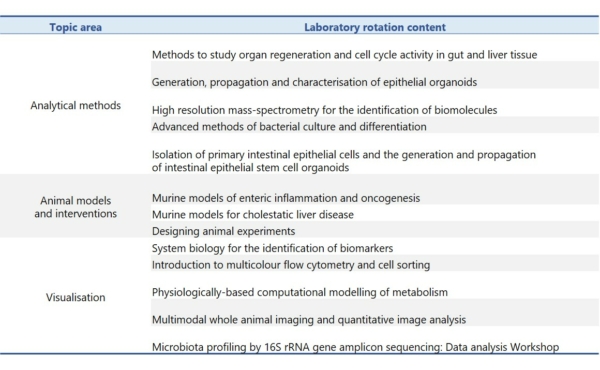Laboratory rotations allow doctoral candidates to visit other research groups within the CRC 1382 to learn cutting edge laboratory techniques and state-of-the art methods. These included (i) advanced training in analytical methods such as high resolution mass spectrometry or bacterial culture and differentiation, (ii) the presentation of animal models and interventions such as models of hepatic cholestasis, as well as (iii) the introduction to visualisation and data analysis techniques such as multimodal whole body imaging, multicolour flow cytometry and cell sorting or 16S rRNA gene amplicon sequencing-based microbiota profiling. Beside their educational character, laboratory rotations also provide a platform for discussions, help to foster collaborations within the consortium, and promote and harmonise experimental procedures and parameters such as dietary schedules, details of animal models, and pre-analytical sampling protocols used by the different groups of CRC 1382. All courses are offered once yearly or upon request by the students.

As an unique opportunity we offer clinical rotations to our doctoral candidates of life science in order to provide insight into medical practice and clinical patient care. Those clinical rotations are meant to strengthen the translational aspect of the scientific question persued within the CRC and are therefore of high importance. Clinical rotations include a ward round in an intensive care unit, an endoscopy exam of the gastrointestinal tract, an interventional radiology exam of the portal and liver circulation, and an abdominal surgical intervention. They provide insight in the daily clinical work at an university hospital and help to prepare doctoral candidates for a professional career at the interface between basic life science and clinical research.

A large number of soft skill courses are offered to the students of our graduate school, such as courses and workshops on biostatistics, bioinformatics, research data management, computational biology as well as a series of talks on career opportunities were given. The latter introduce for example the fields of research journalism, regulatory affairs, clinical research and public affairs. Additionally, soft skill courses on scientific writing and good scientific practice complete the educational programme.
